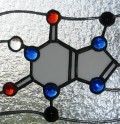 Science news links for July 23rd through July 26th:
Science news links for July 23rd through July 26th:
- ACS and RSC Sustainability Alliance – The Royal Society of Chemistry and the American Chemical Society have joined forces to launch a sustainability website. Be interesting to know what is the carbon footprint of this endeavour and the server electricity bills…
- Carcinogen suspects – A new report from the American Cancer Society and other world-leading health groups identifies gaps in research for 20 suspected carcinogens whose potential to cause cancer is as yet unresolved. Of course, that research could prove that any one of those agents doesn't actually cause cancer at all, which will be annoying for the activists. But, it's the inclusion of "shift work" in the list that is perhaps most confusing? How do they anticipate extracting exposure to shift work from all the many other factors…?
- No more squeaky voiced party tricks – What do MRI machines, rockets, fibre optics, LCDs, food production, welding, and lighter-than-air party balloons all have in common? They all need helium. But, we're running out of this gas and it could all be gone in less than three decades.
- Cialis in stained glass – Chemical artwork created in stained glass shows 2D structures of theobromine (chocolate's "analog" of coffee's caffeine and coca's cocaine) as well as Lilly's answer to erectile dysfunction drug Viagra, Cialis.
- Latest issue of The Alchemist on Chemweb – New light is shed on the crystallization processes involved in constructing polymer-based photovoltaic materials, The Alchemist this week learns, while a novel framework for improving magnetic resonance imaging is also explored. In physical science a fundamental property, the size of a proton, is not what it seems and may impact on fundamental physics, chemistry, and spectroscopy alike. New work on phytochemicals reveals that compounds found in celery and various other plants may have an anti-inflammatory effect through their interaction with a specific enzyme. Remote analysis of materials using laser fluorescence triggered by the terahertz waves emitted by explosives and chemical weapons could improve homeland security. Finally, expertise in pyrolysis has led to the establishment of a startup company at Iowa State that will help develop novel liquid bio-oils.